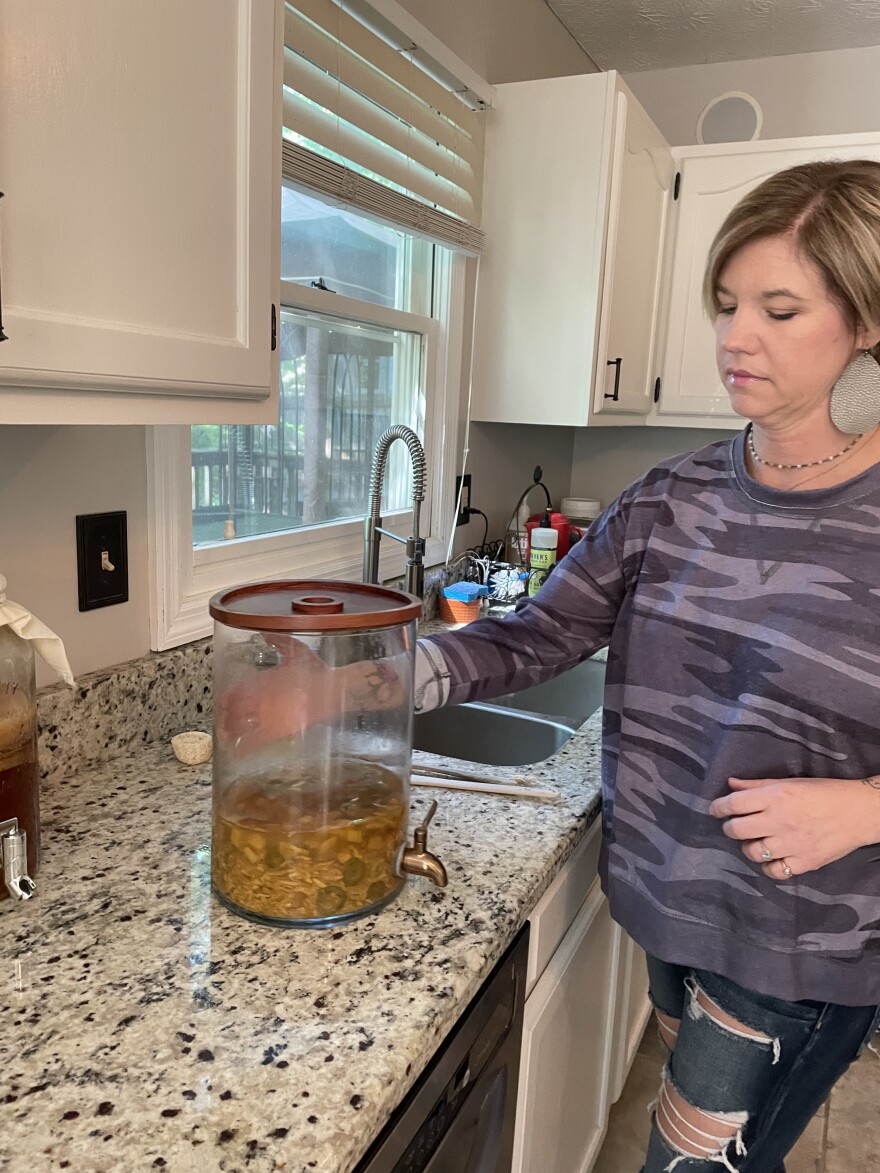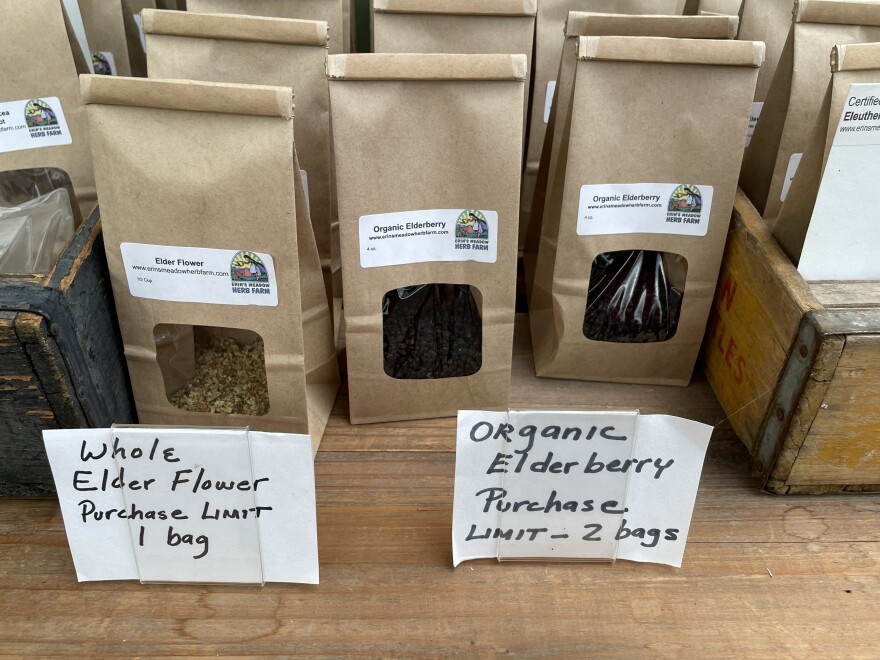This story is a part of a latest episode of Inside Appalachia. Click here to hear the full episode.
Crystal Wilson’s small backyard beds and animal pens sprawl off either side of a mud drive on the facet of a ridge south of Knoxville. She’s been gardening and tending the herbs on her forest ground in Rockford for a quarter-century.
As we speak, natural treatments are experiencing a renaissance. Trade trackers reported an explosion in gross sales — and costs — final 12 months. However this “new-age” pattern has been a standard supply of wellness and independence in Appalachia for hundreds of years.
Wilson grew up in Southwest Virginia studying about wild crops on lengthy walks together with her father, who was a manufacturing facility employee. Her grandparents made extra cash gathering crops to promote at an herb home in Marion. It dried them and bought the elements to pharmacies.
“Appalachia was the pharmacy of the US,” she stated. “We’d harvest the crops right here, they’d go to compounding pharmacies and that might make medication. So people might collect issues and take them to promote them to make extra cash. That’s all the time been a part of who we’re right here. We simply forgot it.”
Wilson didn’t overlook. Till the COVID-19 pandemic, Wilson bought treatments from her farm and at a farmer’s market, largely to girls.
She realized the talents from not solely her household, however Appalachian girls she taught to learn throughout her first job after school.
“They have been all working girls,” she stated. “It’s not as unhealthy in Appalachia because it was 30 years in the past, however (illiteracy) was an actual factor — you already know, they’d have another person signal their checks for them on the grocery retailer. So I taught them — and thru that, they taught me.”
As a writing train, the ladies wrote down house treatments they knew. Wilson took these on a literacy alternate program to the Bronx and shared them. The Puerto Rican and Dominican girls there wrote down their very own. Wilson was struck by the similarities in people knowledge amongst girls from totally different environments and cultures.
Traditionally, girls have turned to herbs once they wanted assist with well being issues like menopause and household planning, Wilson stated. Many individuals right this moment additionally use natural treatments for a number of different issues of our age: sleeplessness, nervousness and despair.
“That talks about who we’re as a individuals, and what we wrestle with,” she added.
Elderberry Is The Gateway
For lots of people, elderberry is a gateway to different conventional treatments, Wilson stated. In late spring, she makes a tincture of elderberry flowers and honeysuckle steeped in vodka. She stated it helps convey down an elevated temperature, whether or not a fever or sizzling flashes.
“That is what retains me grounded to this land: Herbs have totally different cycles,” she stated. “My 12 months is deliberate round what’s harvested and the way it’s harvested.”
It begins with violets within the spring, then honeysuckle flowers.
“Then we’ll do leaves by the summer season,” she stated. “Within the fall, the power of the plant goes again down within the floor and the foundation, in order that’s if you wish to harvest the foundation, ideally in the course of the waning moon.
A wandering flock of noisy, angry-sounding guinea fowl adopted her as she appeared for a totally flowering elderberry bush after a cool spring. Choosing her manner amongst goat and hen pens, she scolded an escaped child. It bleated at her, unimpressed.

After a hunt, Wilson broke off clusters of elderberry flowers like small lace doilies. After checking for bugs, she washed the elderberry and a few honeysuckle flowers in a steel bowl stuffed with water from one of many big sq. rain barrels constructed onto platforms on the corners of her home.
That’s an instance of how Wilson values what trendy science has to show about conservation, local weather change and medication. She’s getting recommendation this summer season from the non-profit Appalachian Sustainable Improvement, which goes to go to the farm and advocate enhancements to make her woods even higher for deep-forest botanical crops like goldenseal.
As a diabetic who depends on insulin, Wilson emphasizes that natural treatments usually are not an alternative choice to trendy medication. She has even taught workshops for nurses about the best way to keep away from interactions between natural treatments and prescriptions.
“For a tincture, you already know, it’s a plant and alcohol base,” she defined. “I often use potato vodka as a result of a whole lot of people acquired wheat allergy symptoms. So now we’re going to take our potato vodka and canopy this up.” She poured a full bottle of it on prime of the flowers in a glass jar.
When somebody buys a tincture, Wilson makes use of a components primarily based on their age and weight to personalize the dosing. She’s conscious of recent challenges.
“We’ve acquired a whole lot of opioid habit, so you already know, you don’t wish to give somebody battling that an alcohol,” she stated. “So I’ll use glycerin and even apple cider vinegar for somebody like that.”
She units the jar in a windowsill, and shakes it when she walks by each day. In six to eight weeks, she’ll pressure it and put it in little amber dropper bottles. The darkish bottle will help it final a few years.
“So every part is gradual about this, from the crops to the medine,” Wilson stated. “Nothing’s quick. There’s knowledge in that.”
Wilson says she’s involved that the rising mainstream reputation of natural treatments will result in over-harvesting Appalachian forest crops, because it has with ginseng and ramps.
However she stated she’s excited to see suburban enthusiasm for conventional treatments truly driving extra Appalachians again to them.
“It’s so great to see individuals (go) ‘I do know that!’ — and to have that gentle bulb come on once more,” she stated.
Age-Outdated To “New Age”
Faculty-educated, suburban girls have helped popularize natural treatments, which might now be present in drug and grocery shops, Wilson stated. Jill Richards, a mom of six residing on the outskirts of Knoxville, displays this pattern.
“I feel undoubtedly by the years there’s been extra of an uptick in simply common suburban mothers desirous to do issues naturally,” she stated.

Richards began making house treatments nearly 25 years in the past in Florida, as a result of she didn’t wish to give something unnatural to her new child. She realized recipes from books, her chiropractor, and different mothers. The ladies would get collectively to make salves and diaper rash cream whereas their toddlers performed.
As her children aged, Richards got here to depend on different treatments for her household — like hearth cider.
On her counter is a giant glass container with a spigot, the type most of her neighbors may use to serve iced tea at a celebration. However hers comprises a lightweight amber liquid thick with floating white fragments and flower-like slices of pepper.
“So you are taking horseradish root, onions and garlic, habanero peppers, some herbs and spices and issues like that, after which put them down in apple cider vinegar and let it ferment for 4 weeks,” she stated. “I drink it each day in the course of the winter, and I feel it eliminates something.”
She poured some right into a helpful shot glass and tossed it again.
“It is extremely sizzling,” she stated, wincing briefly. “However I’m telling you, I don’t suppose something unhealthy might stay close to you for those who drink that!”
Richards used to promote a few of her treatments in shops. However in recent times she simply sells elderberry syrup, which has gained mainstream reputation for averting flu and colds. Some medical analysis appears to indicate it might strengthen immune response and shorten sickness.
Richards places out the phrase on Fb when she cooks a batch from dried berries ordered on-line. (Generally she makes it into gummies for her children.) She says natural treatments are a part of a holistic method to well being.
“It’s attention-grabbing to me that we name them ‘different,’ as a result of that is what individuals used to heal for 1000’s of years,” stated Richards, who is anxious about over-prescriptions of antibiotics making them ineffective. “That is the unique medication: crops and berries, and oils, and extracts.”
Gardening For Independence
Trendy girls like Richards can now study the talents in formal courses. Within the rolling fields of Clinton, Tennessee, a dozen members of a neighborhood Pink Hat Society perch on stools round a bar in a greenhouse, clinking ceramic teacups. They’ve simply had a workshop on natural tea at Erin’s Meadow Herb Farm taught by farm proprietor Kathy Burke Mihalczo. She grew up largely outside in close by Oak Ridge, however she first realized about herbs from a co-worker at a backyard middle.
Mihalczo says the rising curiosity in natural treatments from her prospects, who largely stay in Knoxville, displays the broader pattern of desirous to know the place our meals and medication comes from.

That went into overdrive in the course of the coronavirus pandemic, when extra individuals additionally turned to gardening.
When the COVID-19 pandemic hit, Erin’s Meadow began promoting out of immune-boosters like dried elderberry and echinacea. Mihalczo says a few of her on-line patrons have been hoarding. She give up promoting greater than a bag at a time.
“I feel it did make individuals suppose, particularly when shops have been closed and eating places have been closed… ‘If I did have an damage or an sickness, what would I do if I couldn’t get to the shop for retailer purchased medicines? I wish to know what I might develop and use proper out of my yard if I’ve a stomachache, my little one couldn’t sleep, now we have a small burn,’” she stated. “And I feel individuals realized that they have been depending on retailer purchased issues and possibly they didn’t should be.”
This story is a part of the Inside Appalachia Folkways Reporting Project, a partnership with West Virginia Public Broadcasting’s Inside Appalachia and the Folklife Program of the West Virginia Humanities Council. The Folkways Reporting Venture is made potential partially with assist from Margaret A. Cargill Philanthropies to the West Virginia Public Broadcasting Basis. Subscribe to the podcast to listen to extra tales of Appalachian folklife, arts, and tradition.


